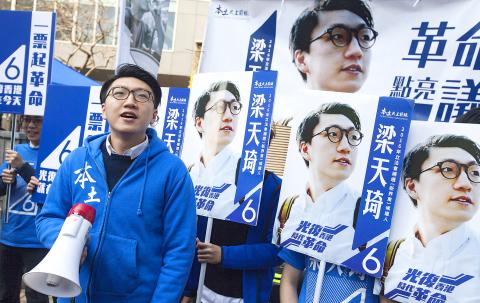A Hong Kong activist who promotes independence from China and was involved in recent street battles with police stood for office yesterday in a key by-election that highlights the territory’s political fault lines.
Edward Leung (梁天琦), 24, one of the leaders of “localist” group Hong Kong Indigenous, is vying to become a legislator after a prominent pro-democracy politician stepped down.
Leung is taking on six other contenders for the New Territories East seat, including candidates from pro-Beijing and pro-democracy camps.

Photo: EPA
Since massive rallies in 2014 calling for fully free leadership elections failed to win concessions from Beijing, young protesters like Leung have become increasingly disillusioned with the more established pro-democracy parties.
Smaller groups have emerged under a “localist” banner, pushing for greater autonomy and even independence from China, as fears over interference from Beijing grow.
Their frustrations spilt over into violence earlier this month when running street battles left more than 100 injured after masked protesters hurled bricks at police, who fired warning shots in the air.
Leung is facing a rioting charge for his involvement.
“Hongkongers are the masters of their own soil,” Leung said yesterday.
“I will defend Hong Kong people’s interests and Hong Kong people’s rights,” he told reporters.
Leung is not tipped to win, but his candidacy would be a barometer of how much support the fledgling localist movement can garner at the ballot box.
“I voted for him. We need to speak out about what’s happening,” a 56-year-old engineer surnamed Cheung said. “It’s completely understandable that young people want change.”
Others urged calm.
“We should not be radical,” a 40-year-old voter surnamed Yeung said.
“Any problems should be dealt with peacefully and rationally,” she said.
Observers said Alvin Yeung (楊岳橋) of the established pro-democracy Civic Party or Holden Chow (周浩鼎) of the pro-Beijing Democratic Alliance for the Betterment of Hong Kong are most likely to win.

VAGUE: The criteria of the amnesty remain unclear, but it would cover political violence from 1999 to today, and those convicted of murder or drug trafficking would not qualify Venezuelan Acting President Delcy Rodriguez on Friday announced an amnesty bill that could lead to the release of hundreds of prisoners, including opposition leaders, journalists and human rights activists detained for political reasons. The measure had long been sought by the US-backed opposition. It is the latest concession Rodriguez has made since taking the reins of the country on Jan. 3 after the brazen seizure of then-Venezuelan president Nicolas Maduro. Rodriguez told a gathering of justices, magistrates, ministers, military brass and other government leaders that the ruling party-controlled Venezuelan National Assembly would take up the bill with urgency. Rodriguez also announced the shutdown

Civil society leaders and members of a left-wing coalition yesterday filed impeachment complaints against Philippine Vice President Sara Duterte, restarting a process sidelined by the Supreme Court last year. Both cases accuse Duterte of misusing public funds during her term as education secretary, while one revives allegations that she threatened to assassinate former ally Philippine President Ferdinand Marcos Jr. The filings come on the same day that a committee in the House of Representatives was to begin hearings into impeachment complaints against Marcos, accused of corruption tied to a spiraling scandal over bogus flood control projects. Under the constitution, an impeachment by the

Exiled Tibetans began a unique global election yesterday for a government representing a homeland many have never seen, as part of a democratic exercise voters say carries great weight. From red-robed Buddhist monks in the snowy Himalayas, to political exiles in megacities across South Asia, to refugees in Australia, Europe and North America, voting takes place in 27 countries — but not China. “Elections ... show that the struggle for Tibet’s freedom and independence continues from generation to generation,” said candidate Gyaltsen Chokye, 33, who is based in the Indian hill-town of Dharamsala, headquarters of the government-in-exile, the Central Tibetan Administration (CTA). It

China executed 11 people linked to Myanmar criminal gangs, including “key members” of telecom scam operations, state media reported yesterday, as Beijing toughens its response to the sprawling, transnational industry. Fraud compounds where scammers lure Internet users into fake romantic relationships and cryptocurrency investments have flourished across Southeast Asia, including in Myanmar. Initially largely targeting Chinese speakers, the criminal groups behind the compounds have expanded operations into multiple languages to steal from victims around the world. Those conducting the scams are sometimes willing con artists, and other times trafficked foreign nationals forced to work. In the past few years, Beijing has stepped up cooperation